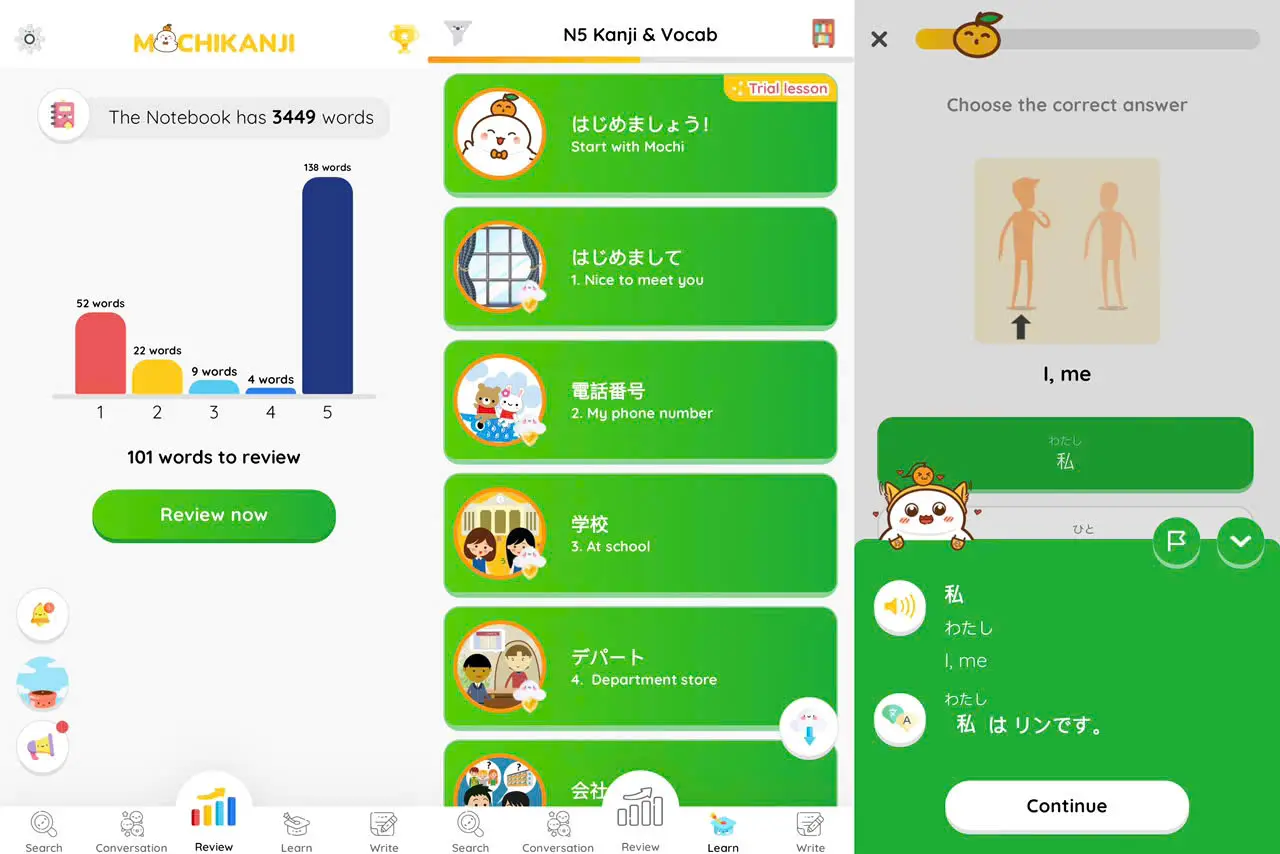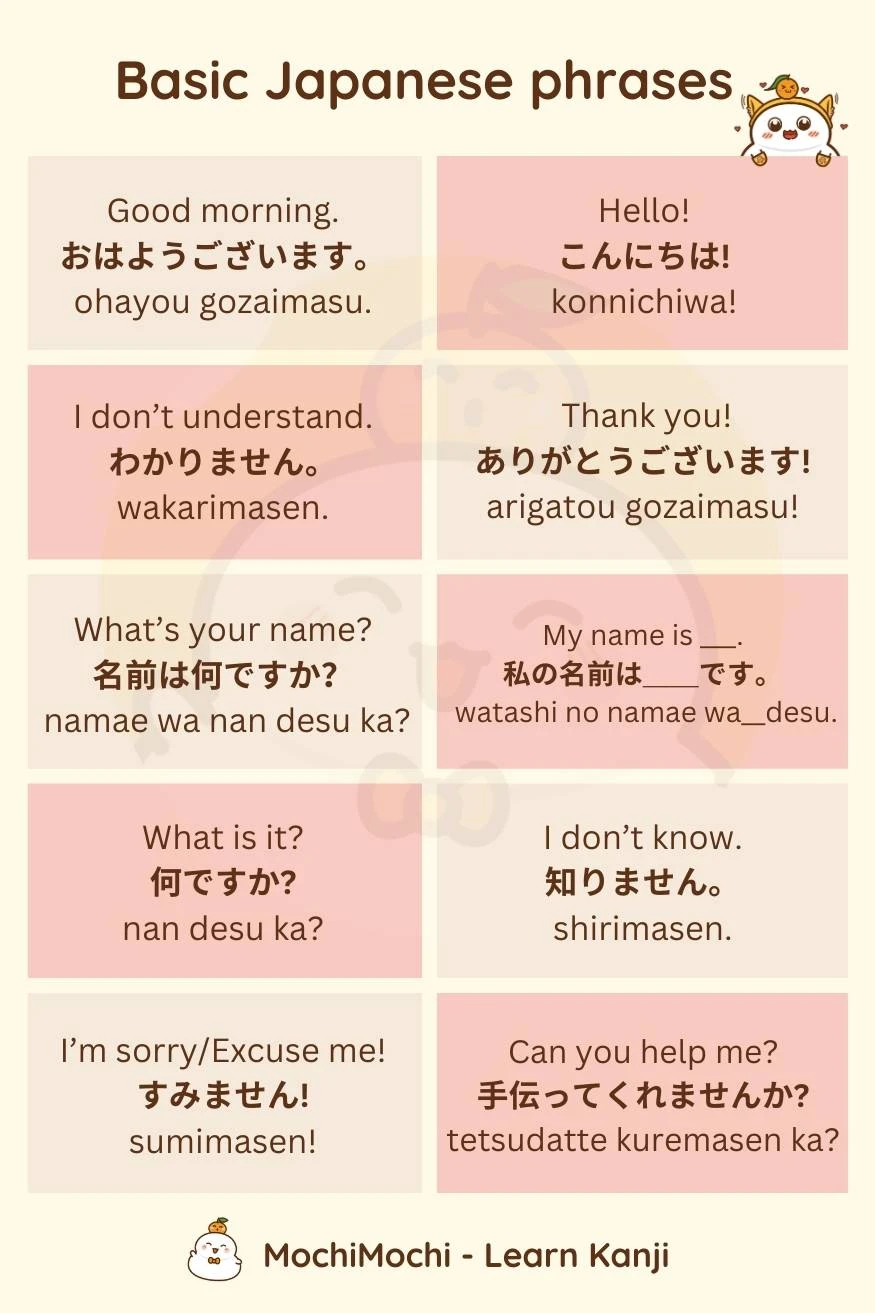Learning how to speak Japanese can be an exciting journey! If you’re a beginner, don’t worry. With dedication and the right approach, you’ll be speaking Japanese in no time. Here are 10 tips to speak Japanese for beginners.

You can’t speak Japanese if you skip the basics
Just like building a house, you need a strong foundation when learning a language. Skipping the basics will make things harder later on. So, start with the fundamentals (hiragana, katakana, and basic grammar structures) and build up from there.
These elements form the backbone of Japanese, enabling learners to build vocabulary, understand sentence construction, and develop proper pronunciation. Skipping these basics can lead to misunderstandings and slow progress. By focusing on these core components initially, learners can establish a solid foundation, making the acquisition of more complex language skills smoother and more effective.
Learn the Japanese Alphabets
Japanese uses three writing systems: Hiragana, Katakana, and Kanji. Start with Hiragana and Katakana because they are the simplest and most used for basic reading and writing.
Mastering hiragana, katakana, and kanji is crucial for language proficiency. Hiragana and katakana, the phonetic scripts, are essential for reading and writing basic Japanese. Kanji, with its thousands of characters, represents more complex words and concepts.
Understanding these alphabets allows for accurate pronunciation, better comprehension, and effective communication. Skipping this step can hinder progress and limit your ability to fully engage with the language.
MochiKanji app is a fantastic app that helps you memorize Kanji characters through interactive exercises and quizzes. Regular practice with MochiKanji will make learning Kanji fun and effective.

Learn basic grammar
Grammar is the backbone of any language. Learn the basic sentence structures, such as the subject-object-verb order in Japanese. Simple grammar rules will help you form correct sentences and understand how the language works.
Japanese grammar, with its subject-object-verb structure, differs significantly from English. Understanding how to form sentences, use particles, and conjugate verbs and adjectives is crucial. Without this foundation, even simple communication can be difficult. Basic grammar enables you to construct coherent sentences and express ideas accurately. It also helps you understand others better, making conversations smoother and more meaningful. Invest time in learning basic grammar to build a strong foundation for your Japanese language skills.
Practice some key phrases
Practicing key phrases is essential if you want to speak Japanese. These phrases are the foundation of everyday communication and help you navigate various social situations.
Start with basic greetings like “こんにちは” (konnichiwa – hello) and “おはようございます” (ohayou gozaimasu – good morning). Learn polite expressions such as “ありがとうございます” (arigatou gozaimasu – thank you) and “すみません” (sumimasen – excuse me/sorry). Practice introducing yourself with “はじめまして” (hajimemashite – nice to meet you) and “わたしは [your name] です” (watashi wa [your name] desu – I am [your name]). Regular use of these phrases in conversations will build your confidence and improve your fluency.
Immerse in Japanese media
One of the best ways to learn a language is to surround yourself with it. Watching Japanese TV shows, movies, and anime helps you get used to the natural flow of conversations and improves your listening skills. Listening to Japanese music and podcasts enhances your vocabulary and pronunciation.
Reading Japanese books, manga, and news articles strengthens your comprehension and introduces you to new words and phrases. By surrounding yourself with Japanese media, you engage with the language in a fun and natural way, accelerating your learning and boosting your confidence in speaking Japanese.
Practice with native speakers
Speaking with native Japanese speakers is incredibly beneficial. You can find language exchange partners, join conversation groups, or even hire a tutor. Engaging in conversations with native speakers helps you improve your pronunciation, learn colloquial expressions, and understand cultural nuances.
Language exchange programs, online tutors, and conversation clubs are great ways to find native speakers. These interactions provide real-life practice, immediate feedback, and a deeper understanding of the language. Consistent practice with native speakers builds your confidence, enhances your listening skills, and makes your Japanese sound more natural and authentic.
Record yourself speaking
Learning to speak Japanese involves many techniques, and one of the most effective is recording yourself speaking. This method offers several benefits that can significantly accelerate your language learning process.
When you record yourself speaking Japanese, you can listen to your pronunciation and compare it with native speakers. This helps you identify areas where you might be mispronouncing words. Pronunciation is critical in Japanese, as slight variations can change the meaning of words. By recording and reviewing, you can make the necessary adjustments to sound more natural.
Recording yourself allows you to practice speaking without the pressure of a live audience. You can take your time, experiment with different phrases, and correct mistakes as you go. This repeated practice builds fluency, as you become more comfortable with the rhythm and intonation of Japanese. Over time, you’ll notice an increase in your confidence when speaking.
Keeping a record of your speaking practice provides a tangible way to track your progress. Listening to recordings from a few weeks or months ago can show you how much you’ve improved. This can be incredibly motivating, as it highlights your growth and areas that still need work.
Recording yourself allows for focused practice. You can concentrate on specific aspects of the language, such as certain grammatical structures, vocabulary, or pronunciation. By focusing on these areas and listening back, you can ensure you’re practicing correctly.
Recording yourself speaking Japanese is a valuable practice technique. It helps you identify and correct mistakes, build confidence, track progress, and engage in focused practice. Incorporate this method into your study routine to enhance your Japanese speaking skills effectively.
Be consistent
Learning a new language, such as Japanese, is a rewarding journey that requires dedication and persistence. One of the most important aspects of this journey is consistency. If you want to speak Japanese fluently, you need to be consistent in your practice and study habits.
Consistency in language learning helps reinforce what you’ve already learned and enables you to build upon your knowledge gradually. Here are some key reasons why consistency is essential:
Regular practice ensures that the vocabulary, grammar, and phrases you learn remain fresh in your mind. When you study sporadically, you’re more likely to forget important concepts and have to relearn them, which can be frustrating and time-consuming.
Consistency helps in forming a habit. When learning becomes a part of your daily routine, it feels less like a chore and more like a natural part of your day. This habitual practice is crucial for long-term retention and progress.
By practicing consistently, you make steady progress. Language learning is a cumulative process where each new piece of knowledge builds on the previous one. Regular practice helps you to steadily climb the ladder of proficiency, ensuring you don’t have gaps in your understanding.
Maintaining consistency can be challenging, especially with a busy schedule. Here are some tips to help you stay on track:
Set specific goals
Set clear, achievable goals for your language learning. Whether it’s learning a certain number of new words each week or being able to hold a basic conversation, having goals gives you something to strive for.
Create a study schedule
Dedicate specific times of the day to study Japanese. Whether it’s 20 minutes in the morning or an hour in the evening, having a set schedule helps you stay disciplined.
Engage with Japanese media
Immerse yourself in Japanese by watching TV shows, listening to music, or reading books and manga. This not only makes learning fun but also ensures you’re regularly exposed to the language.
Join a language group
Joining a language group or finding a language partner can provide motivation and accountability. Regular conversations with others learning Japanese can keep you engaged and motivated.
Consistency is key to mastering Japanese. By incorporating regular practice into your daily routine, setting clear goals, and using the right tools and resources, you can make steady progress and achieve fluency. Remember, language learning is a marathon, not a sprint. Stay consistent, and you’ll see the results over time.
Use language learning apps
Learning Japanese can be a challenging but rewarding journey. One of the most effective ways to enhance your learning experience is by using language learning apps. These apps offer a variety of tools and resources that make studying Japanese more manageable and enjoyable.
Language learning apps provide structured lessons, interactive exercises, and the flexibility to practice anytime, anywhere. They are designed to cater to different learning styles, whether you prefer visual aids, audio lessons, or interactive quizzes. Apps also track your progress, helping you stay motivated and see how far you’ve come.
One highly recommended app for learning Japanese, particularly Kanji, is MochiKanji. Kanji characters are essential for reading and writing in Japanese, but they can be daunting due to their complexity and number. MochiKanji addresses this challenge with its user-friendly and engaging approach.

MochiKanji offers a variety of features to enhance your learning experience, including interactive lessons that make learning fun and effective, a comprehensive built-in dictionary to look up words and understand their meanings and uses, and dedicated sections for practicing Kanji strokes to perfect your writing. Additionally, it provides conversation practice sections where you can apply newly learned vocabulary in practical conversations.
Learning how to speak Japanese is a wonderful and rewarding experience. By starting with the basics, practicing consistently, and immersing yourself in the language, you’ll make great progress. Use tools like the MochiKanji app, engage with native speakers, and stay motivated. Remember, every step you take brings you closer to fluency. Happy learning!
With these tips, you’re well on your way to speaking Japanese confidently. Enjoy the journey and embrace the challenges along the way. You’ve got this!
FAQs
How do I teach myself to speak Japanese?
Here are comprehensive answers to your questions about learning Japanese:
How do I teach myself to speak Japanese?
Teaching yourself to speak Japanese requires a structured approach and consistent practice. Start by familiarizing yourself with the basic sounds of the language, including the five vowel sounds and consonant sounds. Next, learn Hiragana and Katakana, the two phonetic scripts used in Japanese, as they are essential for reading and writing. Incorporate listening and speaking practice into your routine by using language learning apps, watching Japanese movies or TV shows, and listening to music or podcasts. Additionally, try practicing with native speakers through language exchange platforms or conversation groups. Consistency is key, so set daily goals for vocabulary, grammar, and conversation practice.
How to speak Japanese basic words?
Begin with essential greetings and everyday expressions, such as “こんにちは” (konnichiwa – hello), “ありがとう” (arigatou – thank you), and “さようなら” (sayounara – goodbye). Use flashcards or apps to reinforce your memory, and practice speaking them aloud. Engaging in conversations with native speakers or language partners will also boost your confidence.
What are the 10 Japanese words?
Here are ten useful Japanese words to get you started:
- こんにちは (konnichiwa) – hello
- ありがとう (arigatou) – thank you
- さようなら (sayounara) – goodbye
- はい (hai) – yes
- いいえ (iie) – no
- お願いします (onegai shimasu) – please
- おはよう (ohayou) – good morning
- こんばんは (konbanwa) – good evening
- すみません (sumimasen) – excuse me/sorry
- わかります (wakarimasu) – I understand
How can I learn Japanese language myself?
Learning Japanese by yourself can be an enjoyable and fulfilling experience. Start with the following steps:
- Review and Reflect: Regularly review what you’ve learned to reinforce your memory, and don’t hesitate to seek feedback on your speaking skills.
- Set Clear Goals: Define your learning objectives, whether they are conversational skills, reading, or writing.
- Learn the Basics: Begin with Hiragana and Katakana, followed by basic grammar rules and vocabulary.
- Utilize Resources: Use a variety of resources such as textbooks, online courses, mobile apps, and YouTube tutorials.
- Practice Regularly: Consistency is vital. Set aside time each day for practice, even if it’s just 15-30 minutes.
- Engage with Media: Watch Japanese films, anime, or listen to music to improve your listening skills and familiarize yourself with the culture.
- Speak with Others: Find language exchange partners or join online forums to practice speaking with native speakers or fellow learners.







